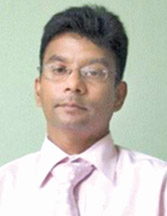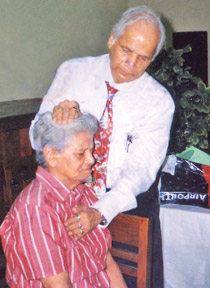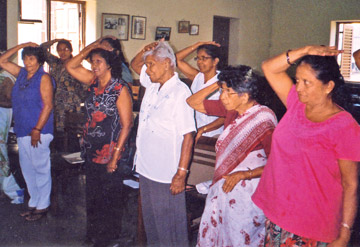|
Health Watch
Glaucoma, sneak thief of sight
|

Glauloma-Pressure |
Nadira GUNATILLEKE
The World Glaucoma Day fell on March 12. Glaucoma is a disease that
cause progressive damage of the optic nerve at the point where it leaves
the eye to carry visual information to the brain.
If left untreated, most types of glaucoma progress (without neither
warning or obvious symptoms to the patient) towards gradually worsening
visual damage and may lead to blindness. Once incurred, visual damage is
mostly irreversible and this has lead to glaucoma being described as the
`silent blinding disease’ or the `sneak thief of sight’.
There is no cure for glaucoma as yet and vision loss is irreversible.
However medication or surgery (traditional or laser) can halt or slow
down any further vision loss. Therefore early detection is essential to
limiting visual impairment and preventing the progression towards severe
visual handicap or blindness.
Your doctor can detect glaucoma in its early stages and advice you on
the best course of action.
Therefore when you go for routine examination for spectacles, better
get your eye pressure checked.
Due to the silent progression of the disease at least in its early
stages up to 50 percent of affected persons in the developed countries
are not even aware of having glaucoma.
This number may rise to 90 percent in underdeveloped parts of the
world.
Intraocular pressure is considered as a risk factor for glaucoma,
together with other factors such as racial ancestry, family history,
high myopia and age.
Healthy food, healthy life
Nadira GUNATILLEKE
‘A large number of hotel workers from the Colombo city suffer from
Hepatitis and Tuberculosis (TB)!’ This is not a piece of gossip, a part
of a tele drama or a movie. This is a news appeared in all leading local
newspapers last week. May be now you are shivering and feel sick! Better
get yourself checked for hepatitis and TB if you have regular meals from
Colombo’s food outlets.
|

Unhygienic storage practice |
This is the reality of most of the ‘eating houses’ in Colombo. They
serve nice tasty food in front but their kitchen is a ‘garbage house’.
On top of that workers are also suffering from infectious diseases.
You think that your food is safe because it appears nice and tastes
good, but it is not.
The best option is to bring your food from home. Then you can avoid
unnecessary trouble. The other benefit is you can cook what you want and
always eat healthy food. You can avoid unhealthy cooking ingredients
that make food tasty. If you really need to be healthy, you can cook
some food for you and bring it with you when you come to work or come to
Colombo for any other purpose. This is a must for school children who
stay after school.
But if you cannot bring your food from home you can go for hot and
steamy food. It will save you for a certain extent. It is good if you
can heat your take away food using a microwave before eat it. Another
option is asking one of your friends to bring food for you and pay
him/her for your lunch parcel.
According to Health Ministry statistics, it is Colombo city where the
highest number of TB patients are detected all the time. TB spreads
mainly from the Colombo city. If you work or live in the Colombo city
and often deal with a large number of people or visiting congested
public places, you should be aware of TB and its symptoms.
If your ordinary cough last for a long time and you have other
symptoms of TB, you should get yourself checked from a State or private
hospital. It will save your health and the health of many others around
you especially your loved ones’. Now DOT Centres are available in
private hospitals too.
Hepatitis and TB are not the only diseases that spread by consuming
unhygienic food. There are other diseases caused by Salmonella, Shigella
etc. Hepatitis A is distinguished from other viral causes by its
prolonged (2–6 week) incubation period and its ability to spread beyond
the stomach and intestines, into the liver. It often induces jaundice,
or yellowing of the skin, and rarely leads to chronic liver dysfunction.
The virus has been found to cause the infection due to the
consumption of fresh-cut produce which has fecal contamination.
Contaminated food and water spread Hepatitis E, another type of
Hepatitis.
Sri Lanka’s first Vitrification test tube
With over 300 pregnancies and 150 successful deliveries, the highest
in Sri Lanka - to its credit, the Lanka Hospitals Fertility Centre is
unquestionably on par with the best IVF centres the world over.
Operational for just over 28 months, the fertility centre recently
announced yet another achievement for the hospital as well as for Sri
Lanka itself – the birth of the first Vitrification test tube baby.
|

Dr Madara Ralapanawe |
Speaking on the occasion of the announcement, Lakith Peiris, CEO of
Lanka Hospitals said “we are very happy to be able to offer this service
to families that are unable to conceive through conventional methods and
normal medical procedure. The advancements in technology and the
fertility clinics commitment to ensuring that our slogan ‘where life
begins’, ensures that each of our patients receive our fullest attention
to make their hopes for a family a reality”.
The latest development in Vitro Fertilization – Vitrification is the
scientific process that involves converting a substance into a glass
like solid form through the quick removal of heat. Applying this
procedure to freeze embryos, the hospital is able to prevent damage to
the embryos and ensures that storage is possible for up to ten years –
giving the patient an opportunity to repeat the procedure at a fraction
of the cost and without going through the entire process from the start.
With a 42 percent success rate, the ability to have multiple embryos
in stored safely makes it possible for patients who do not conceive
immediately to try again, or to utilize those embryos to repeat the
process for a second baby.
Speaking on the successful delivery of Sri Lanka’s first
Vitrification IVF baby Dr Madara Ralapanawe, clinical embryologist said
“because our clinic operates with technology that is on par with the
best fertility centres in the world and since our staff consist of best
gynecologists and other staff in Sri Lanka – the Lanka Hospitals
fertility centre aims to deliver results to each and every one of our
patients.
We plans to further increase our success rate to over 50 percent, by
blastocyst culture (day five embryo transfer) the successful delivery of
our first Vitrification test tube baby is indeed a cause for
celebration”.
Japanese touch healing therapy
Edward ARAMBEWALA
|

Relieving neck pain of a patient through the T H Therapy |
|

Training session |
Dr Shashikant Seth from Bombay, India demonstrated the effectiveness
of the Japanese Touch Healing therapy in removing stress in life
recently.
He did this at a meeting of the YMCA women’s Auxiliary held at the
YMCA Auditorium in Colombo, where he was invited to speak on this
healing therapy. The women’s Auxiliary President thanked the Daily News
health page ‘Healthwatch’ for writing about the visit of this doctor to
Sri Lanka and about this Japanese stress relieving therapy he was
advocating, in the medical page on February 28.
Dr Seth in his talk said that this Japanese Touch healing system
makes use of using powers in nature in strengthening the immunity of two
persons through the touch healing system, which he was going to
demonstrate on a few Association members who were having stress in life
inflicted neck and shoulder pains, making the movement of neck and arms
painful and difficult.
These members who were trusted in the touch healing therapy for less
than 10 minutes were able to move their arms and neck easily. Dr Seth
got the entire group present at the talk to do some simple exercises,
which he said if continued morning and night daily in the morning and
before going to bed at night would relieve most of the aches and pains
in the body, which most of us get as we advance in years in life.
He also recommended a vegetarian diet for the elders.
Drugs for heartbeat problem
Treating stroke survivors for a heartbeat problem called atrial
fibrillation (AF) might prevent many patients from going on to develop
dementia, UK experts believe.
|

A heart trace or ECG can show up the problem |
Research into nearly 50,000 patients’ records found that AF after a
stroke more than doubles the risk of dementia.
Doctors say we should now investigate whether more vigorous treatment
with drugs to control AF might delay or even prevent dementia.
The work appears in Neurology journal.
“Atrial fibrillation is the most common heart rhythm disturbance and
affects up to 500,000 people in the UK. Although not usually
life-threatening in itself, it does increase the risk of stroke.
These results may help us identify potential treatments that could
help delay or even prevent the onset of dementia”. Blood-thinning drugs
and medication to slow the irregular heartbeat are often prescribed to
reduce stroke risk. Now experts at the University of East Anglia in the
UK believe tighter management of AF might also offer some protection
against dementia.
They looked at research where people with and without AF were
followed up to see how many went on to develop dementia. By analysing 15
separate studies they found that stroke survivors with AF were 2.4 times
more likely to develop dementia than stroke survivors who did not have
the heart condition. About a quarter of patients with stroke and atrial
fibrillation were found to have developed dementia during follow-up.
Lead researcher Dr Phyo Kyaw said: “These results may help us
identify potential treatments that could help delay or even prevent the
onset of dementia.
“Options could include more rigorous management of cardiovascular
risk factors or of AF, particularly in stroke patients.” Rebecca Wood of
Alzheimer’s Research UK said: “While this paper shows there is a link
between atrial fibrillation and dementia, we don’t yet know if treating
atrial fibrillation will prevent or delay the onset of dementia. “More
research will give us the answers we urgently need.”
–BBC
Play more, watch less
Sara Gable
Did you know?
Average number of TVs per household: 3
Number of TV murders elementary-aged children see: 8,000
Percent of households with no TV rules: 53
Kids who have a TV in their bedroom: 68 percent
How much more likely these kids are to smoke cigarettes than kids who
don’t have a TV in their bedroom: 3.5 times
Love it or hate, TV is part of American family life. Americans watch
three to four hours of TV daily. This time includes watching prerecorded
movies, playing video games and surfing the Internet, sometimes
simultaneously.
We undeniably enjoy these activities, which can be relaxing,
entertaining and educational.
Like too much of any good thing, however, research suggests that the
amount of time we spend in front of the screen can have negative
consequences.
We are more likely to snack on high-calorie foods while watching TV
and less likely to be physically active.
No other waking activity burns fewer calories than watching TV — not
even other sedentary activities like playing video games, reading and
talking on the phone.
Adults who watch three hours of TV a day are far more likely to be
obese than adults who watch less than one hour. The same goes for
children. The risk for becoming and remaining overweight before the age
of 9 increases with the amount of TV time.
National Turn It Off Week, April 19–25, is a good time to take a look
at your family’s viewing habits.
How many hours are spent in front of a TV or computer screen compared
to other activities?
Instead of turning on the TV and plopping down on the couch, gather
the family and come up with a list of alternate activities. Jot down
lots of ideas and post them on the refrigerator.
Make changes gradually. Set limits. Experts recommend no more than
two hours a day of recreational TV, computers, video games and DVDs for
kids.
Going “cold turkey” can backfire. We crave what we can’t have.
Know what your children, at any age, are watching — whether it’s
cartoons, sitcoms, sports, news or educational programs.
Talk to them about what they’re seeing. Ask open-ended questions.
Take TVs out of bedrooms. Sleeping with the TV on, even with the
sound off, can disrupt sleep patterns and contribute to fatigue. Kids
who have TV sets in their bedrooms also score lower in math, reading and
language arts than kids who don’t.
Turn off the TV during meals. Use the time to talk about everyone’s
day.
Things to do instead of watching TV:
Families
Plan and prepare meals together.
Visit a park or public library.
Go on a picnic.
Play charades or board games.
Take a walk down the street and collect litter.
Dance and sing to music (check your library for music CDs).
Have a family talent night.
Take a “Sunday drive” to a new place.
Plan a dream vacation or party.
Walk around the neighborhood and talk about different houses, trees
and gardens.
Catch up at mealtimes (“Share one good thing and one bad thing about
your day…”).
Assign everyone a housekeeping chore, schedule a time to do them, and
celebrate when done.
Catch-up on letter writing, cards and phone calls.
Adults
Read a book or magazine. Find an author you like and read everything
she or he has written.
Look for and try new recipes.
Do stretching exercises or yoga.
Clean out a closet, the garage or the basement.
Find a new hobby or dive in to a neglected one.
Plant flower seeds indoors. When they have sprouted several inches,
transplant them outside.
Volunteer in your community.
Clean under the refrigerator and stove.
Hand-wash woolen sweaters.
Set up an easy-to-use recycling station.
Read a local newspaper.
Organize family photos and write picture captions.
Start a scrapbook about your family.
Gather and give away old clothes and household items.
Teenagers
Think about future careers or jobs. Write a story about yourself
being successful in that career or job.
Volunteer.
Interview your favorite relatives and record their stories.
Write poems or short stories.
Plan and plant a vegetable garden. Create a weeding schedule for the
family.
Sing along to your favorite music. Try writing down the lyrics and
understanding the song’s meaning. |



